 Late on Friday, the U.S. Dept. of Justice filed an objection in Washington D.C. federal court to new laws limiting voting and voter registration rights in the state of Florida. TPM's Ryan Reilly broke the news just before midnight last night.
Late on Friday, the U.S. Dept. of Justice filed an objection in Washington D.C. federal court to new laws limiting voting and voter registration rights in the state of Florida. TPM's Ryan Reilly broke the news just before midnight last night.
The DoJ is said to be calling for a trial in the D.C. court, where the state of Florida had previously filed suit in order to avoid the federal "preclearance" process under the Voting Rights Process for its new restrictive election laws. The new laws institute harsh penalties for third-party voter registration organizations and individuals who fail to turn in new voter registration forms to elections officials within 48 hours of them being completed. The statute would also cut early voting hours nearly in half.
The new voter registration restrictions, passed by Republicans in the state following the 2010 election, has led groups like the non-partisan Florida League of Women Voters, which had been registering new voters in the state for some 70 years, to cancel their registration program citing stiff new penalties which, they say, put the organization and its registration workers at great legal risk. Both the Florida LWV and Rock the Vote, which focuses on voter registration for young voters, have previously filed their own lawsuit challenging the Constitutionality of the new voter registration laws in the state of Florida.
Over the past several months, a number of high-school teachers, incredibly enough, have been charged under the new law for registering their own students to vote. Last November, MSNBC's Rachel Maddow covered the topic in an interview with the Supervisor of Elections of Volusia County, FL, who, though she is a Republican, said she felt "sick to her stomach" after being forced to turn in one of those teachers to law enforcement officials.
On Thursday night, Comedy Central's The Colbert Report ran a somewhat more amusing, if equally disturbing, take on the issue, focusing on one of the teacher's snagged by Florida law enforcement for "voter registration fraud" under the draconian new restrictions...
Section 5 the Voting Rights Act (VRA), requires certain jurisdictions, including parts or all of 16 different states with a history of racial discrimination, to receive "preclearance" from the DoJ for all new election-related laws, or otherwise receive approval for the new laws from the federal district court in D.C. During the DoJ preclearance process for Florida's new laws, the agency requested more information about them from the state, which includes five difference "covered" counties. Instead of responding, Florida decided to avoid DoJ judgment all together by taking their case directly to the D.C. court instead.
According to TPM's Reilly, the DoJ stated in their filing in that same court last night...
The DoJ is seeking a trial in the case, rather than the hoped-for quick decision by a 3-judge panel. A trial is likely to forestall implementation of the new law before Florida's August primary election when Republican's had hoped it would take full effect.
Section 5 of the VRA places the burden of proof on covered jurisdiction to demonstrate that any new election law does not have a discriminatory effect on voters. In December, the DoJ rejected a new polling place Photo ID restriction in the state of South Carolina under Section 5 of the VRA, finding that, according to the state's own submitted statistics [PDF], "minority registered voters were nearly 20% more likely to lack DMV-issued ID than white registered voters, and thus to be effectively disenfranchised" by the new law.
The DoJ also found "the state's submission did not include any evidence or instance of either in-person voter impersonation or any other type of fraud that is not already addressed by the state's existing voter identification requirement."
Existing South Carolina law already requires voters to present either a state-issued drivers' license, a state-issued DMV ID, or a voter registration card when voting at the polls. The new law would have amended that so that a voter registration cards mailed to voters would no longer be valid for voting. The state has vowed to appeal the DoJ rejection in federal court.
The state of Texas, where Republicans also passed a similar polling place Photo ID restriction last year, is still facing the DoJ's preclearance process. Last September the department asked the state to answer a number of questions about their new law, after the DoJ had already found their new Congressional redistricting plan, as approved by TX Gov. Rick Perry, had been "adopted, at least in part, for the purpose of diminishing the ability of citizens of the United States, on account of race, color, or membership in a language minority group, to elect their preferred candidates of choice to Congress."
Polling place Photo ID restrictions have been found, in study after study, to have a discriminatory effect against the elderly, students, minorities and the disabled, all of whom have a tendency to vote Democratic, but disproportionately lack the type of ID required by the new laws. At the same time, little or no voter fraud is likely to be deterred by such restrictions, as in-person polling place voter impersonation is extraordinarily rare, according to evidence from even the proponents of such laws.
In other jurisdictions not covered by the VRA's Section 5, however, the DoJ has been far less pro-active in protecting the rights of voters. Section 2 of the same act bars laws with a racially discriminatory intent or effect, but places the burden of proof on the challenging party to show discrimination, rather than on the covered jurisdiction to show that there is none. Therefore, as such cases can be much more difficult to prove, they are far more rare.
Last week, The BRAD BLOG's Ernest A. Canning argued that the DoJ should intervene in a Section 2 case recently filed in the state of Wisconsin, where Republicans have also instituted new polling place Photo ID restrictions in advance of the 2012 Presidential election. Wisconsin, unfortunately, is not one of the jurisdictions covered by Section 5.
"While it may well be appropriate, or easier, for the DoJ to continue to rely upon Section 5 in 'covered' jurisdictions," Canning wrote in his well-argued report, "it is manifestly inappropriate for the DoJ's Civil Rights Division to sit on the sidelines as those jurisdictions that are not covered by Section 5 abridge the constitutional rights of U.S. citizens, as afforded by the 15th Amendment."
Last December, U.S. Attorney General Eric Holder offered a formal speech regarding the DoJ's intention to vigorously enforce Section 5, including in the state of Florida where the DoJ has now entered the legal fray. He and the agency in general, however, have so far failed to speak publicly to Section 2 concerns for voters who may soon find themselves without access to the ballot box and their voting rights in places not covered by Section 5.
Last month in Wisconsin, a number of voters found themselves disenfranchised at the polling place during a primary election, as the first full implementation of the GOP's new polling place Photo ID restrictions in the Badger State finally kicked in.


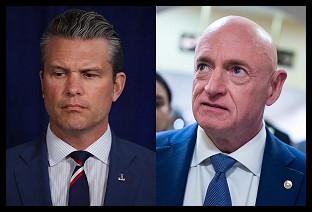 Court Blocks Hegseth Censure of Sen. Mark Kelly
Court Blocks Hegseth Censure of Sen. Mark Kelly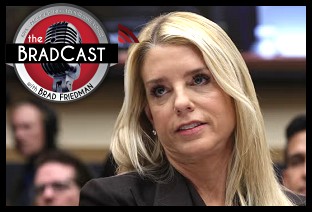 Harpy Tantrums, Legal Losses, Election Fails, Retreating ICE and Other Hopeful Signs: 'BradCast' 2/12/26
Harpy Tantrums, Legal Losses, Election Fails, Retreating ICE and Other Hopeful Signs: 'BradCast' 2/12/26 'Green News Report' 2/12/26
'Green News Report' 2/12/26
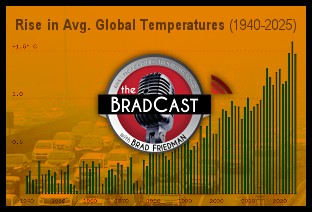 'Let Kids with Asthma Suffer': Trump to Reverse EPA's Landmark 'Endangerment Finding': 'BradCast' 2/11/26
'Let Kids with Asthma Suffer': Trump to Reverse EPA's Landmark 'Endangerment Finding': 'BradCast' 2/11/26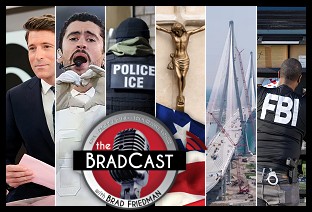 Trump's Presidency Now About Little More Than Racism, Corruption, Culture War Nonsense: 'BradCast' 2/10/26
Trump's Presidency Now About Little More Than Racism, Corruption, Culture War Nonsense: 'BradCast' 2/10/26 'Green News Report' 2/10/26
'Green News Report' 2/10/26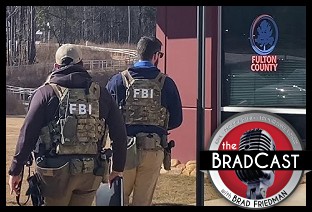 About Trump's FBI Raid of the Fulton County, GA Elections Warehouse: 'BradCast' 2/9/26
About Trump's FBI Raid of the Fulton County, GA Elections Warehouse: 'BradCast' 2/9/26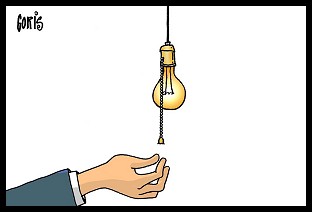 Sunday 'Dead in Darkness' Toons
Sunday 'Dead in Darkness' Toons 'New START' Treaty Allowed to End Amid New World Disorder: 'BradCast' 2/5/26
'New START' Treaty Allowed to End Amid New World Disorder: 'BradCast' 2/5/26 'Green News Report' 2/5/26
'Green News Report' 2/5/26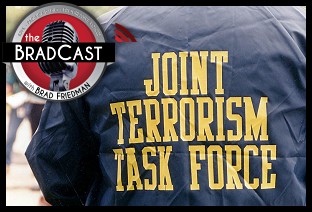 Trump Turns 'War on Terror' Tools Against Domestic Political Foes: 'BradCast' 2/4/26
Trump Turns 'War on Terror' Tools Against Domestic Political Foes: 'BradCast' 2/4/26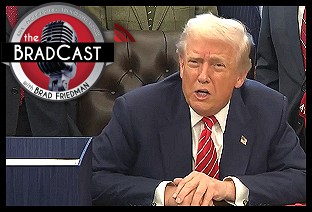 Losing Legally and Politically, Trump Threatens to 'Nationalize' Elections: 'BradCast' 2/3/26
Losing Legally and Politically, Trump Threatens to 'Nationalize' Elections: 'BradCast' 2/3/26 'Green News Report' 2/3/26
'Green News Report' 2/3/26 Bad and Good Bunnies, and an Electoral Shock in Deep 'Red' TX: 'BradCast' 2/2/26
Bad and Good Bunnies, and an Electoral Shock in Deep 'Red' TX: 'BradCast' 2/2/26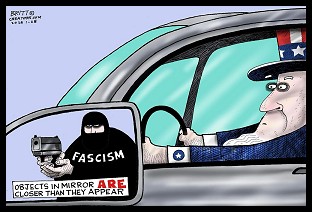 Sunday 'Mirror, Mirror' Toons
Sunday 'Mirror, Mirror' Toons 'Green News Report' 1/29/26
'Green News Report' 1/29/26 It's About Elections and the Windmills of His Mind: 'BradCast' 1/29/26
It's About Elections and the Windmills of His Mind: 'BradCast' 1/29/26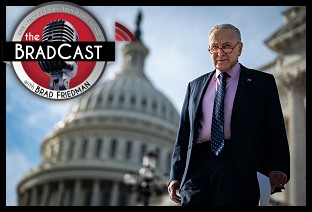 Govt Shutdown Over ICE Funding Near Certain This Weekend: 'BradCast' 1/28/26
Govt Shutdown Over ICE Funding Near Certain This Weekend: 'BradCast' 1/28/26 Trump Blinks, Bovino Out, MN Op Falters, Persists as Midterms Loom: 'BradCast' 1/27
Trump Blinks, Bovino Out, MN Op Falters, Persists as Midterms Loom: 'BradCast' 1/27  The ICE Murder of ICU Nurse Alex Pretti and the Heroes of Mpls: 'BradCast' 1/26/26
The ICE Murder of ICU Nurse Alex Pretti and the Heroes of Mpls: 'BradCast' 1/26/26  The BRAD BLOG: 22 Years and Still Counting
The BRAD BLOG: 22 Years and Still Counting Mr. Smith Testifies (Publicly) in Washington: 'BradCast' 1/22/26
Mr. Smith Testifies (Publicly) in Washington: 'BradCast' 1/22/26 World Turning Against Self-Destructing U.S. Under Trump: 'BradCast' 1/21/26
World Turning Against Self-Destructing U.S. Under Trump: 'BradCast' 1/21/26 Trump Waste, Fraud, Abuse on Voting, at DOJ, by DOGE: 'BradCast' 1/20/26
Trump Waste, Fraud, Abuse on Voting, at DOJ, by DOGE: 'BradCast' 1/20/26
 VA GOP VOTER REG FRAUDSTER OFF HOOK
VA GOP VOTER REG FRAUDSTER OFF HOOK Criminal GOP Voter Registration Fraud Probe Expanding in VA
Criminal GOP Voter Registration Fraud Probe Expanding in VA DOJ PROBE SOUGHT AFTER VA ARREST
DOJ PROBE SOUGHT AFTER VA ARREST Arrest in VA: GOP Voter Reg Scandal Widens
Arrest in VA: GOP Voter Reg Scandal Widens ALL TOGETHER: ROVE, SPROUL, KOCHS, RNC
ALL TOGETHER: ROVE, SPROUL, KOCHS, RNC LATimes: RNC's 'Fired' Sproul Working for Repubs in 'as Many as 30 States'
LATimes: RNC's 'Fired' Sproul Working for Repubs in 'as Many as 30 States' 'Fired' Sproul Group 'Cloned', Still Working for Republicans in At Least 10 States
'Fired' Sproul Group 'Cloned', Still Working for Republicans in At Least 10 States FINALLY: FOX ON GOP REG FRAUD SCANDAL
FINALLY: FOX ON GOP REG FRAUD SCANDAL COLORADO FOLLOWS FLORIDA WITH GOP CRIMINAL INVESTIGATION
COLORADO FOLLOWS FLORIDA WITH GOP CRIMINAL INVESTIGATION CRIMINAL PROBE LAUNCHED INTO GOP VOTER REGISTRATION FRAUD SCANDAL IN FL
CRIMINAL PROBE LAUNCHED INTO GOP VOTER REGISTRATION FRAUD SCANDAL IN FL Brad Breaks PA Photo ID & GOP Registration Fraud Scandal News on Hartmann TV
Brad Breaks PA Photo ID & GOP Registration Fraud Scandal News on Hartmann TV  CAUGHT ON TAPE: COORDINATED NATIONWIDE GOP VOTER REG SCAM
CAUGHT ON TAPE: COORDINATED NATIONWIDE GOP VOTER REG SCAM CRIMINAL ELECTION FRAUD COMPLAINT FILED AGAINST GOP 'FRAUD' FIRM
CRIMINAL ELECTION FRAUD COMPLAINT FILED AGAINST GOP 'FRAUD' FIRM RICK SCOTT GETS ROLLED IN GOP REGISTRATION FRAUD SCANDAL
RICK SCOTT GETS ROLLED IN GOP REGISTRATION FRAUD SCANDAL VIDEO: Brad Breaks GOP Reg Fraud Scandal on Hartmann TV
VIDEO: Brad Breaks GOP Reg Fraud Scandal on Hartmann TV RNC FIRES NATIONAL VOTER REGISTRATION FIRM FOR FRAUD
RNC FIRES NATIONAL VOTER REGISTRATION FIRM FOR FRAUD EXCLUSIVE: Intvw w/ FL Official Who First Discovered GOP Reg Fraud
EXCLUSIVE: Intvw w/ FL Official Who First Discovered GOP Reg Fraud GOP REGISTRATION FRAUD FOUND IN FL
GOP REGISTRATION FRAUD FOUND IN FL

































